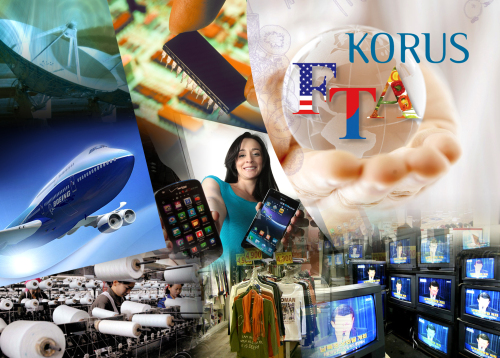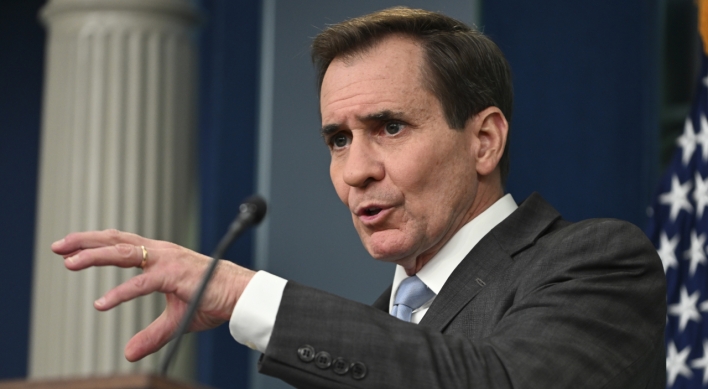Limited impact may be seen on trade tariff elimination, but pact will enhance nation’s brand, image
The Korea-U.S. Free Trade Agreement is likely to boost the local information technology sector as trade costs are expected to drop through the implementation of the pact.
The biggest benefit of the trade pact is that tariffs will be eliminated on over 6,000 electronic goods, including home appliances. Tariffs will be eliminated at different times depending on the product.
According to a report released in August by 10 government agencies on the economic effects of the FTA, exports in the electronics sector will increase $826 million worldwide in the next 15 years, while imports to Korea will drop $32 million in the same period.
The country’s exports to the U.S. in the sector are expected to see a rise of $161 million and U.S. imports into Korea will increase $145 million in the 15-year period, the report said.
Tariffs on 6,171 products, including liquid-crystal display monitors and camcorders, will be removed immediately, while tariffs on 344 other items, such as microwaves and washing machines, will be removed after five years.
The Korea Electronics Association said Korea had missed an opportunity by putting on hold the removal of tariffs on the country’s televisions and home appliances, but expressed its support for postponing tariff elimination for the electronic medical equipment market. The local electronic medical equipment market is still behind that of other advanced countries.

“A good portion of the TVs and home appliances are already produced in overseas plants by the local manufacturers as part of their global business tactics, meaning it will have limited impact on the local economy,” an official at the association said.
The association, composed of over 1,000 companies, also said the country’s electronics and IT industry exported $18.5 billion in goods to the U.S. and imported $10.8 billion worth of goods from the country in 2009.
“Korea’s electronics and IT industry is more likely to gain in the amount of exports to the U.S. than experiencing disadvantages from the trade pact ratified between the two nations,” its official said.
However, as KEA officials have already pointed out, core electronics products like semiconductors and mobile phones, which take up a large portion of trade with the U.S., are already exempt from tariffs due to the World Trade Organization’s Information Technology Agreement.
Samsung Group said on Wednesday that the Korea-U.S. Free Trade Agreement will have a limited effect on the group as most of its electronic goods are already exempt from tariffs.
“I’m not saying we shouldn’t ratify the free trade pact between the two countries, but it will not have a significant impact on the electronics unit,” said Rhee In-yong, head of communications at Samsung Group.
LG Electronics also said the company would not see big changes with the implementation of the pact since its electronic exports ― LCD TVs, PDP TVs, monitors and refrigerators ― to North America are mainly manufactured in the firm’s two plants in Mexico.
Among others, the 1.5 percent tariff applied to local home appliance exports and 5 percent tariff on digital TVs will be eliminated.
For the display equipment sector, the 8 percent trade tariff on equipment imported from the U.S. will be eliminated for local companies, enabling firms like LG Display and Samsung Mobile Display to purchase them at a lower cost.
But it will have the opposite effect for local equipment manufacturers, putting them at a disadvantage in price competitiveness.
In general, the electronics sector does not expect to see immediate benefits for local companies, but it is optimistic that awareness of Korea’s gadgets and electronic items will be raised with the pact.
“Although we don’t expect it to have a boosting effect, it will have a positive impact on the country’s trade and commerce infrastructure in the long term because the amount of trade will be enlarged through the pact,” said an industry source.
By Cho Ji-hyun (sharon@heraldcorp.com)
The Korea-U.S. Free Trade Agreement is likely to boost the local information technology sector as trade costs are expected to drop through the implementation of the pact.
The biggest benefit of the trade pact is that tariffs will be eliminated on over 6,000 electronic goods, including home appliances. Tariffs will be eliminated at different times depending on the product.
According to a report released in August by 10 government agencies on the economic effects of the FTA, exports in the electronics sector will increase $826 million worldwide in the next 15 years, while imports to Korea will drop $32 million in the same period.
The country’s exports to the U.S. in the sector are expected to see a rise of $161 million and U.S. imports into Korea will increase $145 million in the 15-year period, the report said.
Tariffs on 6,171 products, including liquid-crystal display monitors and camcorders, will be removed immediately, while tariffs on 344 other items, such as microwaves and washing machines, will be removed after five years.
The Korea Electronics Association said Korea had missed an opportunity by putting on hold the removal of tariffs on the country’s televisions and home appliances, but expressed its support for postponing tariff elimination for the electronic medical equipment market. The local electronic medical equipment market is still behind that of other advanced countries.

“A good portion of the TVs and home appliances are already produced in overseas plants by the local manufacturers as part of their global business tactics, meaning it will have limited impact on the local economy,” an official at the association said.
The association, composed of over 1,000 companies, also said the country’s electronics and IT industry exported $18.5 billion in goods to the U.S. and imported $10.8 billion worth of goods from the country in 2009.
“Korea’s electronics and IT industry is more likely to gain in the amount of exports to the U.S. than experiencing disadvantages from the trade pact ratified between the two nations,” its official said.
However, as KEA officials have already pointed out, core electronics products like semiconductors and mobile phones, which take up a large portion of trade with the U.S., are already exempt from tariffs due to the World Trade Organization’s Information Technology Agreement.
Samsung Group said on Wednesday that the Korea-U.S. Free Trade Agreement will have a limited effect on the group as most of its electronic goods are already exempt from tariffs.
“I’m not saying we shouldn’t ratify the free trade pact between the two countries, but it will not have a significant impact on the electronics unit,” said Rhee In-yong, head of communications at Samsung Group.
LG Electronics also said the company would not see big changes with the implementation of the pact since its electronic exports ― LCD TVs, PDP TVs, monitors and refrigerators ― to North America are mainly manufactured in the firm’s two plants in Mexico.
Among others, the 1.5 percent tariff applied to local home appliance exports and 5 percent tariff on digital TVs will be eliminated.
For the display equipment sector, the 8 percent trade tariff on equipment imported from the U.S. will be eliminated for local companies, enabling firms like LG Display and Samsung Mobile Display to purchase them at a lower cost.
But it will have the opposite effect for local equipment manufacturers, putting them at a disadvantage in price competitiveness.
In general, the electronics sector does not expect to see immediate benefits for local companies, but it is optimistic that awareness of Korea’s gadgets and electronic items will be raised with the pact.
“Although we don’t expect it to have a boosting effect, it will have a positive impact on the country’s trade and commerce infrastructure in the long term because the amount of trade will be enlarged through the pact,” said an industry source.
By Cho Ji-hyun (sharon@heraldcorp.com)
-
Articles by Korea Herald





![[Music in drama] Rekindle a love that slipped through your fingers](http://res.heraldm.com/phpwas/restmb_idxmake.php?idx=644&simg=/content/image/2024/05/01/20240501050484_0.jpg&u=20240501151646)



![[New faces of Assembly] Architect behind ‘audacious initiative’ believes in denuclearized North Korea](http://res.heraldm.com/phpwas/restmb_idxmake.php?idx=644&simg=/content/image/2024/05/01/20240501050627_0.jpg&u=20240502093000)









![[Today’s K-pop] Stray Kids go gold in US with ‘Maniac’](http://res.heraldm.com/phpwas/restmb_idxmake.php?idx=642&simg=/content/image/2024/05/02/20240502050771_0.jpg&u=)